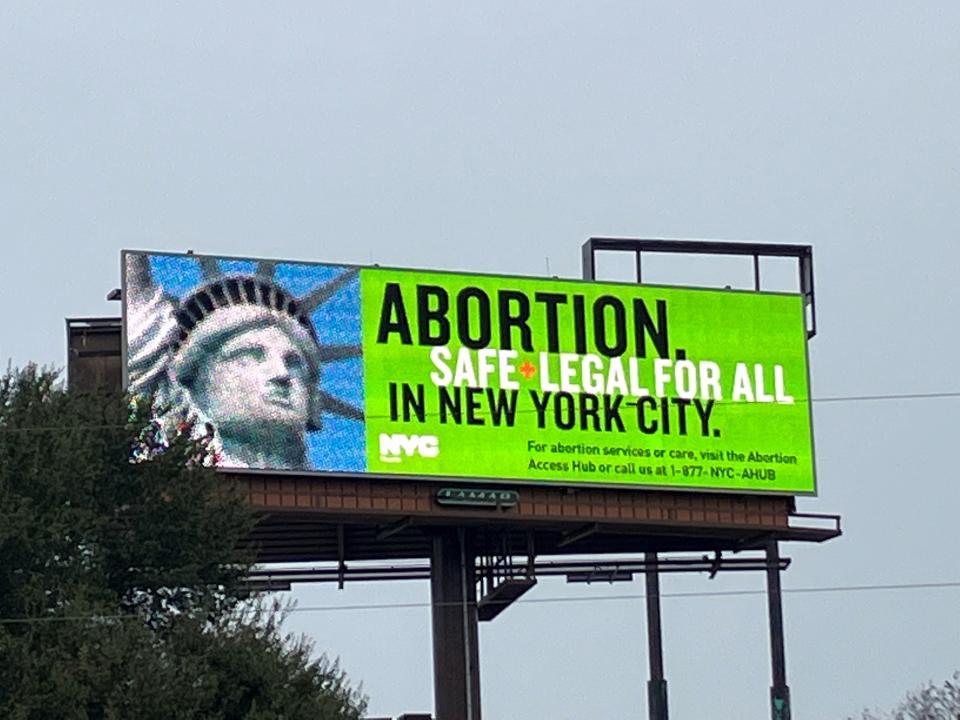Westchester repeals abortion clinic buffer law teed up for Supreme Court challenge
Note: This story has been updated to reflect that Christopher Ferrara worked on a separate lawsuit challenging Westchester's bubble zone ordinance.
The Westchester County Board of Legislators acted quickly on Monday to gut part of a pro-abortion rights law that is currently being teed up for a challenge before the U.S. Supreme Court.
The board voted on Monday to repeal part of the so-called "bubble zone" law, which was passed in the days following the Supreme Court's decision to overturn Roe v. Wade, a decision that had grounded federal abortion rights for decades.
The Westchester law prohibits obstructing entry into a reproductive health care facility, including an abortion clinic, creates a 25-foot "no harassment" zone around clinics and barred activists from moving within 8 feet of people entering these facilities in order to counsel them.

The law allows for imprisonment of up to one year for repeated violations of these new prohibitions. Only the 8-foot rule was repealed by the board's vote Monday morning. Legislator Catherine Borgia, who sponsored the initial bill last year, was the only Democrat to vote against repealing the provision.
Glendalys Salgado, a spokesperson for the board, said that the repeal was "absolutely not" designed to avoid scrutiny by the Supreme Court, where any ruling on Westchester's law could affect similar bubble zone laws across the country.
Salgado explained that the county had received letters from pro-choice organizations including Planned Parenthood and the National Institute for Reproductive Health expressing confusion about how enforcement of the 8-foot bubble zone would actually play out on the ground. This confusion led to the board's reconsideration of the law, she said.
Legislator Damon Maher (D-New Rochelle) said these organizations felt the eight-foot provision "hurt the law, to have something unenforceable in it, especially with the possibility of review by the U.S. Supreme Court."
An intermediate federal appeals court recently rejected a Westchester woman's challenge to the law on free-speech grounds, noting that the Supreme Court's own precedent in Hill v. Colorado established that abortion clinic buffer zones are constitutional under the First Amendment.
The woman, Debra Vitagliano, is now seeking to have her case reviewed by the Supreme Court.
"Vitagliano argues in her briefing why she believes Hill was wrongly decided and is irreconcilable with intervening Supreme Court precedent," the appeals court wrote in its opinion in June dismissing her case. "These arguments have no bearing on the disposition of the appeal now before us."
Vitagliano is asking the Supreme Court to directly overrule Hill, as it did when it overturned Roe v. Wade last year.
Though the two cases involved fundamentally different questions, free speech versus abortion rights, they both bear directly on abortion as an issue, implicating the contentious politics that accompany it.
Anti-abortion advocates hailed Westchester's decision to repeal the provision as an intermediate victory, including Christopher Ferrara, an attorney who worked on a similar lawsuit.
“This is indeed a victory for free speech, and for pro-life advocacy,” Ferrara said in a statement. “We stand ready to put the final nail in its coffin with a petition to the U.S. Supreme Court, if need be, so that it can never be reenacted.”
Christine Ryan, an associate director at Columbia Law School's Law, Rights, and Religion Project, previously told the USA TODAY Network that the Supreme Court's opinion overturning Roe v. Wade "was a real signal to conservative actors that they would get a good hearing once this [buffer zone issue] reaches the Supreme Court."
The high court has not yet decided whether it will take up Vitagliano's case. It remains unclear whether the court could even consider her case, given that the underlying conflict has been resolved. Nevertheless, Maher said the Supreme Court has shown a willingness to defy traditional doctrines favoring restraint.
"This court, if they want to take a case, they've shown they'll take a case," he commented. "Even with our repeal, the court could still decide to invalidate the law."
According to the Guttmacher Institute, four states have laws with statewide effect implementing bubble zone restrictions at abortion clinics. Many other bubble zone restrictions exist in other states at the municipal level.
Asher Stockler is a reporter for The Journal News and the USA Today Network New York. You can find him on Twitter at @quasiasher or send him an email at astockler@lohud.com. Reach him securely: asher.stockler@protonmail.com.
This article originally appeared on Rockland/Westchester Journal News: Abortion clinic bubble zones limited by Westchester amid court battle

